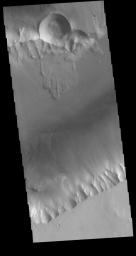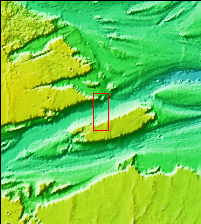
|
Kasei Valles
- Click the image above for a larger view
- Full-Res JPEG (1401 x 2642) (184.1 kB)
- Full-Res TIFF (1401 x 2642) (2.2 MB)
Caption:
This VIS image shows a small portion of Kasei Valles. The channel rim at the top of the image shows a complex series of processes. The crater was the source of the landslide material - either as emplacement of ejecta or from collapse of the rim. To the right of the crater is a semi-circular feature that appears to have collapsed and created blocks of material. A relative time relationship in this image seems to be creation of the channel, impact formation and the ejecta/collapse of the crater, and then the collapse of the material in the semi-circular feature. These events could have happened days apart or millions of years apart.
Orbit Number: 62563 Latitude: 24.1942 Longitude: 297.136 Instrument: VIS Captured: 2016-01-21 05:16
Background Info:
Please see the THEMIS Data Citation Note for details on crediting THEMIS images.
NASA's Jet Propulsion Laboratory manages the 2001 Mars Odyssey mission for NASA's Science Mission Directorate, Washington, D.C. The Thermal Emission Imaging System (THEMIS) was developed by Arizona State University, Tempe, in collaboration with Raytheon Santa Barbara Remote Sensing. The THEMIS investigation is led by Dr. Philip Christensen at Arizona State University. Lockheed Martin Astronautics, Denver, is the prime contractor for the Odyssey project, and developed and built the orbiter. Mission operations are conducted jointly from Lockheed Martin and from JPL, a division of the California Institute of Technology in Pasadena.
Cataloging Keywords:
| Name | Value | Additional Values |
|---|---|---|
| Target | Mars | |
| System | ||
| Target Type | Planet | |
| Mission | 2001 Mars Odyssey | |
| Instrument Host | Mars Odyssey | |
| Host Type | Orbiter | |
| Instrument | Thermal Emission Imaging System (THEMIS) | |
| Detector | ||
| Extra Keywords | Crater, Grayscale, Impact, Thermal | |
| Acquisition Date | ||
| Release Date | 2016-04-08 | |
| Date in Caption | 2016-01-21 | |
| Image Credit | NASA/JPL-Caltech/ASU | |
| Source | photojournal.jpl.nasa.gov/catalog/PIA20446 | |
| Identifier | PIA20446 | |

